The Federal Reserve is Asleep at the Wheel
The Federal Reserve is overcompensating for its loose pandemic monetary policy and setting the stage for a global recession.
Among the more egregious weaknesses of Chairman Jerome Powell’s Federal Reserve is its failure to react to changing circumstances. Last year, that weakness contributed to headline inflation surging to a multi-decade high of 9 percent. Now, that weakness threatens to result in a hard economic landing next year.
In March 2021, at a time when the Fed was following the easiest of monetary policies, President Biden secured passage of the $1.9 trillion American Rescue Plan. That plan came on top of the previous year’s bipartisan budget support in the amount of $3 trillion to ensure recovery from the Covid-induced economic recession. This meant that in two years, the economy received cumulative budget support of almost $5 trillion or a staggering 20 percent of GDP. That was by far the largest U.S. peacetime budget stimulus on record.
While former Treasury Secretary Larry Summers chastised the Biden budget as the most irresponsible budget in the past forty years, the Fed maintained a deafening silence. Worse yet, the Fed kept interest rates at their zero lower bound and allowed the broad money supply to balloon by 40 percent from the beginning of 2021 to the end of 2022. It did so while insisting that the budding inflationary forces building in the economy were a transitory phenomenon.
Fast forward to today, and the Fed has been engaged in its most aggressive monetary policy tightening cycle in decades. Over the past eighteen months, interest rates have been raised by 525 basis points at the same time that the Fed has shifted from an aggressive policy of quantitative easing to one of quantitative tightening. In the process, the Fed has allowed the broad money supply to fall. This has not occurred since broad money supply data began to be published in 1959.
After all this tightening, the Fed is sticking to the mantra that interest rates must be maintained high for longer to regain inflation control. It is doing so despite clear signs that the economy is slowing and despite the likelihood that the full effects of its tightening cycle are yet to be fully felt in the economy. Worse yet, it is doing so despite a number of fundamental changes in the economic and geopolitical landscape over the past few months that heighten the chances of a global financial crisis.
Among the more important of these changes is the return of the bond market vigilantes who are now focusing on the fact that the United States is running a budget deficit of as high as 8 percent of GDP at the peak of the economic cycle. Over the past two months, this has resulted in a dramatic jump in the U.S. ten-year Treasury yields, the bell-weather for world interest rates, from 4 percent to 5 percent, its highest level since 2007. It has also caused mortgage and automobile interest rates to jump to 8 percent. As recently as the beginning of last year, those interest rates were around 3 percent.
One reason that the jump in long-term bond yields should give the Fed pause about the wisdom of sticking to its aggressive monetary policy stance is that high mortgage and auto loan rates are all too likely to crush the housing and automobile sectors of the economy. However, the more important reason is that those interest rates could cause something to break in the U.S. and the world financial system. Not only does the jump in the long-term interest rate causes a further big dent in the banking system’s balance sheet by reducing the value of their substantial bond portfolios. It also makes it all the more difficult for highly indebted companies, especially in the battered commercial real estate space, to avoid defaulting on their loans.
Other recent changes in the economic landscape that could significantly drag the U.S. economy and should be grabbing the Fed’s attention are the slowing in the world economy and heightened geopolitical tensions in the Middle East. China’s economy, the world’s second-largest, is being hobbled by the bursting of its outsized housing and credit market bubble, while the German economy is now in recession as it copes with a Russian-induced energy price shock. Meanwhile, the Israel-Hamas war is now sending international oil prices back towards an aggregate demand reducing $100 a barrel.
If the U.S. does have a hard landing next year, history will judge the Powell Fed harshly. By not responding to changing circumstances, the Powell Fed will have contributed not only to multi-decade inflation but also to another economic recession.
American Enterprise Institute senior fellow Desmond Lachman was a deputy director in the International Monetary Fund’s Policy Development and Review Department and the chief emerging-market economic strategist at Salomon Smith Barney.
Image: Shutterstock.

